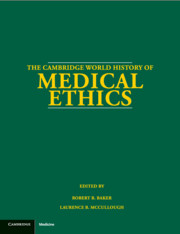Book contents
- Frontmatter
- PART I AN INTRODUCTION TO THE HISTORY OF MEDICAL ETHICS
- PART II A CHRONOLOGY OF MEDICAL ETHICS
- PART III DISCOURSES OF MEDICAL ETHICS THROUGH THE LIFE CYCLE
- PART IV THE DISCOURSES OF RELIGION ON MEDICAL ETHICS
- 9 The Discourses of Hindu Medical Ethics
- 10 The Discourses of Buddhist Medical Ethics
- 11 The Discourses of Confucian Medical Ethics
- 12 The Discourses of Early Christian Medical Ethics
- 13 The Discourses of Orthodox Christian Medical Ethics
- 14 The Discourses of Roman Catholic Medical Ethics
- 15 The Discourses of Protestant Medical Ethics
- 16 The Discourses of Jewish Medical Ethics
- 17 The Discourses of Islamic Medical Ethics
- PART V THE DISCOURSES OF PHILOSOPHY ON MEDICAL ETHICS
- PART VI THE DISCOURSES OF PRACTITIONERS ON MEDICAL ETHICS
- PART VII THE DISCOURSES OF BIOETHICS
- PART VIII DISCOURSES ON MEDICAL ETHICS AND SOCIETY
- Appendix: Biographies: Who Was Who in the History of Medical Ethics
- Bibliography
- Index
15 - The Discourses of Protestant Medical Ethics
from PART IV - THE DISCOURSES OF RELIGION ON MEDICAL ETHICS
Published online by Cambridge University Press: 28 May 2012
- Frontmatter
- PART I AN INTRODUCTION TO THE HISTORY OF MEDICAL ETHICS
- PART II A CHRONOLOGY OF MEDICAL ETHICS
- PART III DISCOURSES OF MEDICAL ETHICS THROUGH THE LIFE CYCLE
- PART IV THE DISCOURSES OF RELIGION ON MEDICAL ETHICS
- 9 The Discourses of Hindu Medical Ethics
- 10 The Discourses of Buddhist Medical Ethics
- 11 The Discourses of Confucian Medical Ethics
- 12 The Discourses of Early Christian Medical Ethics
- 13 The Discourses of Orthodox Christian Medical Ethics
- 14 The Discourses of Roman Catholic Medical Ethics
- 15 The Discourses of Protestant Medical Ethics
- 16 The Discourses of Jewish Medical Ethics
- 17 The Discourses of Islamic Medical Ethics
- PART V THE DISCOURSES OF PHILOSOPHY ON MEDICAL ETHICS
- PART VI THE DISCOURSES OF PRACTITIONERS ON MEDICAL ETHICS
- PART VII THE DISCOURSES OF BIOETHICS
- PART VIII DISCOURSES ON MEDICAL ETHICS AND SOCIETY
- Appendix: Biographies: Who Was Who in the History of Medical Ethics
- Bibliography
- Index
Summary
INTRODUCTION: THE PROTESTANT OUTLOOK ON HEALTH AND MEDICINE
In general, Protestants, like most Christians, have regarded the body as a relative, not an absolute, good. Health is not a virtue (as it was for the Greeks), but a blessing bestowed by God. Both Martin Luther (1483–1546) and John Calvin (1509–1564) echoed a widely held Christian view in arguing that, like every other human condition, good health can be used either for God's glory or for selfish purposes. They also introduced what were to become distinctively Protestant convictions. On the one hand, the Reformers explicitly rejected monastic practices that sought to mortify the body to strengthen the will. The ascetic ideal has for the most part been foreign to Protestant thinking. On the other hand, Protestantism has often encouraged abstinence and moderation in the care of the body. This encouragement has varied from tradition to tradition, receiving its greatest emphasis in Calvinism and pietism. Calvin advised Christians to avoid a preoccupation with health that might encourage too strong an attachment to this world. At the same time Protestants urged care for the body because it was both God's workmanship and the temple of the Holy Spirit. Hence the early Methodists, under the influence of Francis Asbury (1745–1816), discouraged (as did the Quakers) the use of addictive substances, such as tobacco and alcohol, as incompatible with biblical standards of both health and holiness.
- Type
- Chapter
- Information
- The Cambridge World History of Medical Ethics , pp. 255 - 263Publisher: Cambridge University PressPrint publication year: 2008



